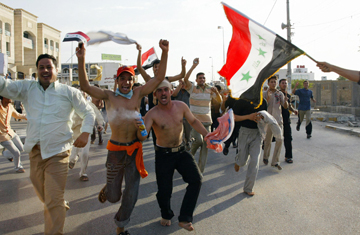
Iraqi supporters celebrate the victory of their country's football team against Saudi Arabia for the final of the Asian Football Cup on July 29 in the Shi'ite holy city of Najaf.
When Baghdad was absolutely certain that Iraq had won the soccer championship against Saudi Arabia in faraway Jakarta, the celebrations began with a sustained blast of AK-47 fire. The happy sound could never be confused with a real gun-battle: few gun-battles, even in Iraq, are that fierce and sustained. Soon the popping of rifle fire was joined by the thudding sound of machine guns — the kind of heavy weapons bolted onto trucks or mounted on rooftops.
For an entire week, all of Iraq had lived for this moment, bearing the cynical attacks of car-bombs and terrorists, who had slaughtered more than 50 people who had rushed into the streets to celebrate after the country's soccer stars won a berth in the Asian Soccer Cup finals by beating 2006 World Cup semi-finalists South Korea. In Baghdad, people stocked up on gasoline for their generators (most of the capital gets only two hours of electricity per day and no one knows when the lights in their area will go out). Abu Ahmad, a taxi driver, described his preparations before the big game against Saudi Arabia: "I bought fuel for my small generator because I don't want to miss the event. Also some refreshments, so me and my family can watch the match together. And we are all ready to celebrate the victory; the flags are ready, cars to drive all around the city, candies to give out, and to show the terrorists that Iraqis are united and we are not afraid from them."
The government, fearing more violence after the final, declared a ban on vehicle traffic beginning half an hour before Sunday's 1-0 victory over Saudi Arabia. Daytime curfews aren't uncommon in Baghdad and Iraq's other large cities. But the streets were even more deserted than usual Sunday afternoon as Iraqis could not be pried from their TVs. Most fans, facing 120-degree temperatures and confined to their neighborhoods by the vehicle ban, watched at home or with friends. In poorer neighborhoods fans without televisions gathered at tea houses. Emptied of people, the streets were given over to stray cats and dogs. The score was 0-0 at halftime, but fans were optimistic as Iraq controlled the action and had several chances to score.
After the goal by striker Younis Mahmoud, the eventual game-winner, a few rounds of Kalashnikov fire popped off around Baghdad. and then when the win came, the sustained artillery fire. But perhaps in deference to pre-game government warnings that celebratory gunfire would not be tolerated, the shooting subsided much sooner than it did after the big semi-final victory over South Korea. There were other ways to celebrate. Fans clapped and sang and danced in the streets. Some set off fireworks. Boys went door to door giving away free orange juice to mark the victory. In one neighborhood Iraqi police drove through the streets waving the Iraqi flag from their trucks.
Iraq's triumph in the Asia Cup signals a soccer program rising from the ashes, even as the country descends deeper into civil conflict. The resurgence of Iraqi soccer is one of the few untainted pieces of good news to emerge from post-invasion Iraq. A powerhouse in the '60s and '70s, the national team faded in the 1980s as Iraq's young men were killed and maimed by the hundreds of thousands in Saddam Hussein's war with Iran. Saddam's son Uday vented his sadism on soccer players and other athletes, forcing them to kick immovable stones and imprisoning them in medieval torture devices. Says Abu Ahmad: "I can't express my feelings. We are so happy, those 25 men brought happiness and hope to 25 million Iraqis, the thing our politicians couldn't do." with reporting by Charles Crain/Baghdad
